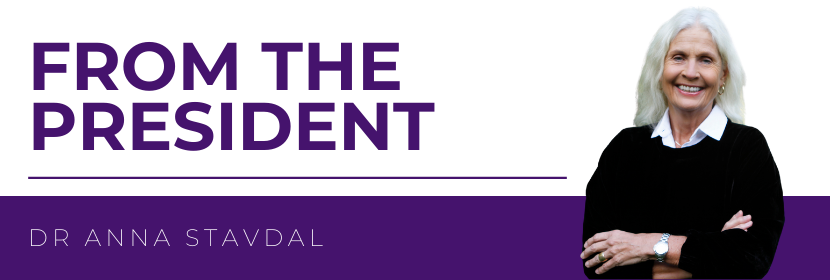From the President: February 2023


Read it in your own language using the google translate bar at the top of the page
Reflections for a New Year
O wad some Pow’r the giftie gie us
To see oursels as others see us!
Robert Burns, 1776 [written in Scottish]
It can be an eye-opener to work with professionals from other disciplines. Striving to communicate how we perceive our field, our awareness of what matters to us deepens. And, what a surprise – and a gift – it can be to discover how we’re perceived. I highly recommend such exchanges.
I’ve been fortunate to cooperate with, among others, Family Therapist and author Susan Schwartz Senstad. She has provided psychotherapy most of her adult life, including to many physicians and caregivers, and her novels,
Music for the Third Ear, and Milk and Venom, delve into the personal impact of war, and of family trauma.
Through our continuing discussions, she and I, the therapist and the physician, keep on learning from each other. Our similarities run deep: at the core of both our endeavors is the on-going relationship with the patient over time. The framework of the clinical stance we share, “person-centred care", places the patient at the centre by prioritizing respect for the values, experiences, needs and preferences of the patient when planning, coordinating and providing care.
We have both also pointed out deficiencies and inconsistencies in how the other’s field actually functions – and what such systemic problems cost us and our patients.
I want to share something that Susan has written about how we GPs let ourselves down as we put two of our Family Medicine Core Values into practice. Both could sort under one heading: “A Physician is also a Person.”
Warning: This content may not make for comfortable reading! However, I consider it so recognizably relevant – for me and my fellow Family Doctors – that I offer it here as my Reflections for a New Year:
•
For the Core Value of “person-centred medicine”:
By not making mention of the physician as a person, you implicitly endorse the age-old but discredited stance of clinical “objectivity”. When caregivers fail to attend to and appropriately integrate their own subjective responses, the interpersonal distance that’s created reinforces the very asymmetry of power that “person-centred medicine” is designed to correct. “Know your place” may be the non-verbal message that patients sense as GPs’ “objective”, objectifying gaze guides the focus safely away from themselves – as if the physicians’ own personhood weren’t an integral part of the exchange. The patient may well feel devalued and the GP may come off as arrogant, unfeeling, invulnerable, inhuman, even inhumane.
Indeed, doctors who are in denial of their own personal vulnerabilities and emotional needs remain ill-equipped to offer their patients adequately tuned empathy, to help them allay their fears or counteract their shame at being unwell, dependent, socially disadvantaged, etc.
•
For the Core Value of “continuity of care”:
Doctoring is good work, but it’s hard – on the whole person and on the lived life, especially over time. Yet, instead of physicians learning “emotional awareness” to help them cope, “emotional detachment” has traditionally been mandated. That potentially damaging stance requires them to downplay, neglect or even deny the impact their work has on them. As you all well know, what isn’t acknowledged and dealt with doesn’t go away. It smoulders. Unattended, it may undermine resilience and exhaust one’s stamina. Too many GPs burn out, have breakdowns, self-medicate, quit, even commit suicide. The field loses them – their patients lose them. What happens, then, to “continuity of care”?
Because GPs are persons, they may be encouraged explicitly to take active and respectful care of their own physical and emotional needs, to insist that the context created by the medical system’s structures also serves the caregivers’ long-term needs, and to demand that help for them as helpers be readily available – and free of shame.
http://susansenstad.com
These reminders become even more timely as we live through challenging circumstances. Global trends such as climate change and financial hardship affect us all, while more regional situations such as armed conflicts affect many. We frontline workers in healthcare observe and experience the consequences in our local communities.
We see that the need for the Family Doctor is greater than ever. We are privileged to be able to make a difference in our patients` lives. And we want to keep doing so – long term. That means that we need to take care of ourselves and each other. Might it be a good idea to make sure that all Family Doctors have Family Doctors of their own?
Happy New Year!
Dr Anna Stavdal
WONCA President